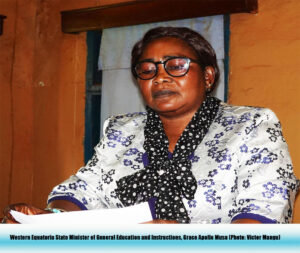
In Western Equatoria State, South Sudan, controversy has erupted over the alleged misappropriation of 18 million pounds in teacher salaries.
The suspension of the county education cashier, Peter John Mungo, has ignited debates about corruption, accountability, and the complexities of governance in a region overwhelmed by financial mismanagement.
And this is not the first case. Corruption has been a pervasive problem in South Sudan since its independence from Sudan in 2011. According to Transparency International’s Corruption Perception Index, the country ranks among the highest in perceived public sector corruption globally. This widespread issue affects all levels of government and economic sectors, with most nominally independent institutions effectively captured by the executive branch.
The recent controversy in Western Equatoria State, involving the alleged misappropriation of 18 million pounds ($4,090.9). in teacher salaries, exemplifies this trend.
Unfortunately, these corrupt practices have dire implications for teachers in South Sudan. Allegations of salary misappropriation create uncertainty about their compensation, leading to financial insecurity and diminished morale. Many educators struggle to provide for their families, worsening an already challenging environment where education is underfunded and undervalued. The lack of accountability and transparency in financial management further hampers their practical teaching ability, as classrooms often suffer from inadequate resources.
Allegations of misuse
On September 3rd, 2024, one of the commissioners in Western Equatoria State, South Sudan, issued an order suspending Peter John Mungo, the County education cashier of Nagero County, for the missing 18,000,000 pounds ($4,090.9).
According to the suspension letter, the county education cashier failed to submit accountability and liquidate for 18,000,000 South Sudanese pounds ($4,090.9) received in Nagero County’s education department as salaries for primary and secondary school teachers for October 2023.
Gabriel Novlo Ferdinand, the County Commissioner, says that some of the “classified and unclassified” staff under this department have not been paid their salaries for October 2023 despite the department confirming receipt of all wages.

“Some primary school teachers in Namutina Payam have not been paid their October 2023 salaries with no clear justifications outlined,” the County Commissioner narrated.
Mugo’s Defense
According to Mungo, his suspension was based on his refusal to comply with the County Commissioner’s demand for a share of the teacher’s salary.
He says the County Commissioner called him for three days, asking the education Cashier for a share of the teachers’ salary that the County Education received.
“We need to tell the reality; the Honorable County Commissioner called upon me. He called me, and he told me to come to him at home for three days, from morning to evening. So, he wanted a share of 18 million South Sudanese pounds to pay teachers,” Said Mungo, the County Education Cashier.
The long-serving county education cashier, who started his work in 2008, continues, “I told the county commissioner that I don’t have any mandate to give him any amount; if he wants a share of the money, he should write an official letter as evidence for accountability.”
He adds that the commissioner didn’t send the request letter after his verbal request over phone calls.
But the county commissioner, Gabriel Novlo Ferdinand, denies Mungo’s allegations. He states that he was ordered by the governor of Western Equatoria State, General Alfred Fotuyo Karaba, to suspend the cashier regarding the 18 million pounds ($4,090.9).
“The governor gave me an order regarding the 18 million and how it has been used; it is not clear. Because the committee released the same money, some people, especially in Namutina, did not get it, and it was released all by the bank; how it disappeared is unclear,” County Commissioner Honorable Novlo explained.
The commissioner describes the suspension of the cashier as “an order from above.”
“No, the suspension is according to the decree, from the top to the lower decree, because when the governor gives the order, it will not go to other branches. So I did the suspension, and then I gave feedback for three months with half salary,” notes Novlo, further stressing that when the time comes, he will inform the governor what to do with this suspension.
A call for clarity
The county education director, Michael Payo, says the money didn’t go missing and terms the cashier’s suspension a political game.
“The procedures which have taken place are political; the steps taken are just between the politicians,” the County education director Michael stated.
“The cashier went and withdrew the money from our bank in Western Bahr el Ghazal, and he brought the money to the county education department with all the bank receipts. But at that moment, I was already going to Western Bahr el Ghazal for training, and I gave him the go-ahead with the payment of the teachers,” Said County education director.
As officials grapple with conflicting narratives, the fate of the educators hangs in the balance. The future of education funding in South Sudan.
Grace Apollo Musa, the State Minister of Education in Western Equatoria, says that she communicated with the County Education Director of Nagero County, who confirmed to her that all the teachers received their salaries.
She emphasizes the importance of transparency regarding teachers’ salaries stressing that, “in the ministry, it is essential that we are informed about any missing funds related to teachers’ salaries. Transparency is key to maintaining trust in our education system.”
She further narrates that, “when we reached out to the Director of Nagero, he assured us that all teachers on the pay list received their salaries, dispelling rumors of missing money.”
Musa also highlighted the feedback from teachers in Namutina Payam saying that, “despite the claims regarding teachers in Namutina, those educators confirmed to the education director that they had indeed received their salaries. It’s unclear where the misinformation originated that led to the cashier’s suspension.”

She also warns the County Commissioners across Western Equatoria State not to intervene in teachers’ payments.
“We are passing this information to all the counties and want to avoid commissioners intervening in teachers’ salaries. As a minister, this money belongs to teachers; even I am not getting it because it’s for teachers, so commissioners should get their money the way money comes to them,” notes the minister.
Teachers speak out
Boledi Alsandoro Stephen, a teacher at Ngoni Primary School in Duma Payam, expresses frustration over being excluded from the October 2023 salary pay-list. He laments that, “initially, our names were submitted for inclusion, but when the payment arrived, mine was missing. Some teachers received their salaries, but three of us did not.”
Boledi notes that while he received salaries for August and September 2023, he was informed that his name was not on the October pay-list.
“The supervisor told us to be patient as they investigate,” the missing out teacher Stephen narrated.
Boledi explains that missing his salary significantly impacts his life. “I dedicate my time to teaching, leaving other work to support my children. Now, without my salary, I feel disheartened and question my efforts,” he laments.
Boledi urged the ministry to resolve these issues to prevent future occurrences, warning that lack of motivation from the ministry will hinder progress.
Baptist Francis, a head teacher at Saint Daniel Primary School in Nagero Center, reveals a similar problem. Accruing to him, out of nine teachers at his school, only eight received their October salaries.
“It’s concerning that some teachers did not receive payment, including one female teacher whose name was absent from the list,” he reveals.
What is worrying is that this issue affects morale. According to Baptist, “when a teacher doesn’t receive their salary, their motivation to teach diminishes. Head teachers find it challenging to encourage them when they are struggling financially.”
He appeals to the county education director to address this problem and ensure it doesn’t continue.
“These situations are unacceptable, and we need the county director’s support to prevent them,” insists Baptist.
According to South Sudan Education Sector Analysis, 2016 Planning for Resilience, The majority of expenditure goes to schools, yet spending on operational costs is low. In 2013/14, out of SSP426 million spent on education in recurrent expenditure, 69.5% went to schools (49% to teacher salaries, 16% to non-teaching staff salaries, and 5% to school operation), while 30.5% went to sector management, with 17% for salaries. This breakdown differs significantly from one sector to another.
Below is the data showing the different distribution of Public Recurrent Expediter at different levels, by Function, 2013/14 (%)
Not an isolated case
The situation in Western Equatoria is not an isolated incident; it reflects the broader challenges of governance and accountability in South Sudan. In August 2020, teachers in Jonglei State, South Sudan, went on strike demanding unpaid incentives, alleging mismanagement of funds from the European Union.
They claimed their six-month incentive worth thirteen million, one hundred and five thousand (13,105,000) South Sudanese Pounds ($2,978.4) had been deposited into the State Ministry of Finance’s account, which the ministry acknowledged but stated was used for other priorities.
Although Jonglei State promised to refund the teachers, only 4.3 million Pounds ($977.2) was reportedly returned, and the teachers indicated they had not received balances from 2019 or any new payments for 2020. Alier Jacob, the secretary general of the teachers’ committee, called on UK-AID and the government to clarify the situation, highlighting that the then school closures and COVID-19 restrictions had made it difficult for teachers to support their families.
The European Union’s teacher incentive project aimed to combat teacher attrition due to low salaries, providing each teacher with $40 (170,000 pounds) monthly to improve attendance and teaching standards.
For teachers in South Sudan, this ongoing fight against corruption means a continued struggle for their rights, salaries, and the future of education in a country desperately in need of reform. Once systemic corruption is addressed, the prospects for educators and their students will be more stable.
This story was produced with support from InfoNile.
